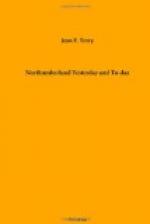“The stout Erle of Northumberland
A vow to God did make,
His pleasure in the Scottish woods
Three summer days to take.”
On the death of Douglas—
“Erle Percy took
The dead man by the hand,
And said, ’Erle Douglas, for thy
life
Would I had lost my land!’”
When the battle is over,
“Next day did many widdowes come
Their husbands to bewayle;
Their bodyes bathed in purple blood
They bore with them away;
They kist them dead a thousand times
Ere they were cladd in clay.”
It was neither of these versions, however, that so moved the heart of gallant Sidney, but a much older one, beginning
“The Perse owt off Northomberlande
And a vow to God made he,
That he wold hunt in the mountayns
Off Chyviat within days iii.”
Other historical ballads are “The Rising of the North,” “The Raid of the Reidswire,” “Flodden Field,” “Homildon Hill” and “Hedgeley Moor.”
The next division may be termed semi-historical; that is, they treat of events which actually happened, but which have chiefly a local interest; and these may therefore be said to be more truly Northumbrian than any others. Such are “Jock o’ the Side,” “Johnnie Armstrong,” “Hobbie Noble” and “The Death of Parcy Reed.”
Of the third class, the romantic ballads, we have not so rich a store; yet “The Gay Goss-hawk,” the “Nut-browne Mayde” and the touchingly beautiful “Barthram’s Dirge” may stand amongst the best of their kind.
“The Gay Gross-hawk” is one of those delightful and imaginative productions of which there are so many examples, in which birds and hounds share their lords’ and ladies’ secrets, and serve them staunchly in hours of peril; they belong to the times when fairies were still seen holding their moonlight revels, when witches exercised their baleful arts, and fearsome dragons wore still to be met and conquered—“and if you do not believe it,” said Dr. Spence Watson, “I am sorry for you!”
The “Nut-browne Mayde” is supposed to have been a Lady Margaret Percy, who lived in the reign of Henry VIII.; and the lover to whom she was so faithful, notwithstanding his trial of her love by declaring that he was an outlaw, and “must to the greenwood go, alone, a banished man,” was Henry Clifford, son of the Earl of Westmoreland. The inordinate length of this ballad forbade its inclusion in the present selection; I am sensible that that selection may appear somewhat meagre, but only want of space has prevented the inclusion of others that many of my readers would doubtless have been glad to see.
Of songs in dialect, Joe Wilson’s “Aw wish yor Muthor wad cum!” stands easily first; and the other, “Sair feyl’d, hinny!” is given as an example of the Northumbrian muse in another mood.
In conclusion, let me say that of the modern verse every example is from the pen of a Northumbrian.




